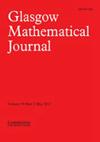迭代单色群族的最大子群
IF 0.4
4区 数学
Q3 MATHEMATICS
引用次数: 0
摘要
巴西利卡(Basilica)群是一个著名的作用于二叉有根树的 2 代弱分支但非分支群。最近,佩奇克(Petschick)和拉杰夫(Rajeev)研究了巴西利卡群的一种更一般的形式,即作用于 $m$ 有根树上的 $s$ 弱分支但无分支群,对于 $s,m\ge 2$ 而言。包含这些广义巴西利卡群的一个更大的群族是迭代单色群族。随着弗朗科尔的新发展,对无限指数最大子群存在性的研究已从分支群扩展到弱分支群。在这里,我们证明了迭代单色群的一个亚族,它更接近于广义巴西利卡群,但只有有限指数的最大子群。本文章由计算机程序翻译,如有差异,请以英文原文为准。
Maximal subgroups of a family of iterated monodromy groups
The Basilica group is a well-known 2-generated weakly branch, but not branch, group acting on the binary rooted tree. Recently, a more general form of the Basilica group has been investigated by Petschick and Rajeev, which is an $s$ -generated weakly branch, but not branch, group that acts on the $m$ -adic tree, for $s,m\ge 2$ . A larger family of groups, which contains these generalised Basilica groups, is the family of iterated monodromy groups. With the new developments by Francoeur, the study of the existence of maximal subgroups of infinite index has been extended from branch groups to weakly branch groups. Here we show that a subfamily of iterated monodromy groups, which more closely resemble the generalised Basilica groups, have maximal subgroups only of finite index.
求助全文
通过发布文献求助,成功后即可免费获取论文全文。
去求助
来源期刊
CiteScore
1.10
自引率
0.00%
发文量
36
审稿时长
6-12 weeks
期刊介绍:
Glasgow Mathematical Journal publishes original research papers in any branch of pure and applied mathematics. An international journal, its policy is to feature a wide variety of research areas, which in recent issues have included ring theory, group theory, functional analysis, combinatorics, differential equations, differential geometry, number theory, algebraic topology, and the application of such methods in applied mathematics.
The journal has a web-based submission system for articles. For details of how to to upload your paper see GMJ - Online Submission Guidelines or go directly to the submission site.

 求助内容:
求助内容: 应助结果提醒方式:
应助结果提醒方式:


